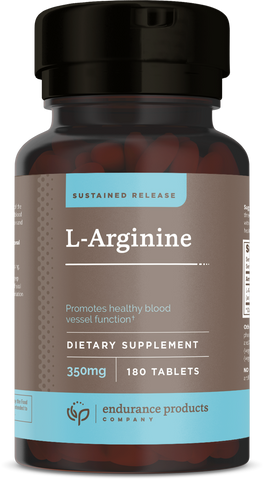L-arginine (ARG) is key to heart health and helps us heal from major stress or trauma. It’s a necessity for pregnant women and infants, especially during growth spurts, and can boost athletic performance and strength.
In our bodies, this semi-essential amino acid is used in a wide variety of metabolic pathways, making compounds our bodies need, like nitric oxide.
In this article, we look at the L-arginine – nitric oxide connection and its significance in cardiovascular protection. Read on to learn more.
Why Maintaining Normal Blood Pressure is Critical
As an amino acid, L-arginine helps the body build protein we need to build muscle and rebuild tissues. It’s pivotal to heart health because it turns into nitric oxide (NO), a molecule responsible for relaxing and widening our blood vessels. NO increases blood flow, helping us maintain blood pressures in healthy normal ranges.
We may take our blood pressure for granted. We need healthy blood flow to circulate oxygen and nutrients throughout the body. We also need it to distribute hormones, which control nearly all the body’s processes, and white blood cells, to fight infection.
But we don’t want the pressure of flowing blood to put undue stress on our vascular system. Keeping our blood pressure in the normal range is important because researchers find that high blood pressure damages the body quickly and leads to a myriad of health complications.
That’s why vasodilator nitric oxide is crucial for heart health. We need it to relax the muscles lining our blood vessels, keep them elastic and smooth, and keep our blood flowing normally.

L-Arginine's Essential Roles in the Body
In addition to helping keep our blood flowing normally, L-arginine is necessary for our bodies to make T-cells, white blood cells essential for immune response. It also contributes to hormone regulation, detoxification, protein synthesis, and male fertility. The list goes on.
As mentioned above, studies show that an increase in L-arginine can improve both aerobic and anerobic athletic performance. It may also improve male sexual function because it improves blood flow.
When to Boost L-Arginine Consumption
Because our bodies make enough L-arginine from other amino acids most of the time, it’s classified as a semi-essential amino acid. Yet, we need more in our diets from time to time. Pregnant women, and infants need more, especially during growth spurts. L-arginine is considered an essential amino acid for them.
Some illnesses, trauma, and disorders can cause L-arginine deficiency. We don’t make more to compensate for the deficiency, so we need to add it.
Doctors may recommend more L-arginine when we’re recovering from surgery, healing from a severe burn, or critically ill. Likewise, when we’re struggling with an infection, sepsis, protein malnutrition, excessive ammonia production, or urea synthesis disorders, we benefit from more l-arginine.
If you are at risk for high blood pressure (family history, poor diet, stress, don’t exercise, or use alcohol/tobacco), it’s worth discussing L-arginine with your doctor.

Natural Sources of L-Arginine
We get L-arginine in our diets from red meat, fish, dairy, and eggs as well as plant sources including soybeans, chickpeas, lentils, oats, nuts, and pumpkin seeds. (We can also boost nitric oxide levels by eating more nitrates like green leafy vegetables.)
Additionally, our Sustained-Release L-Arginine provides a slow, steady release of the amino acid, thanks to our proprietary controlled-release technology.
Please talk to your health care provider before adding L-arginine to your daily regimen. While safe, it’s not recommended for everyone. L-arginine can interact with some medications, herbs, and supplements. It can also exacerbate some conditions.
